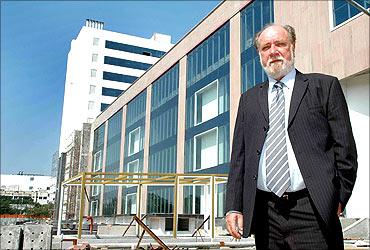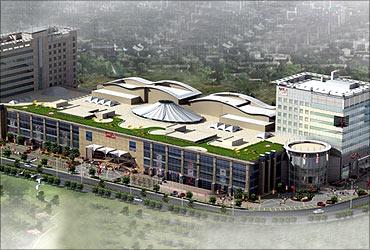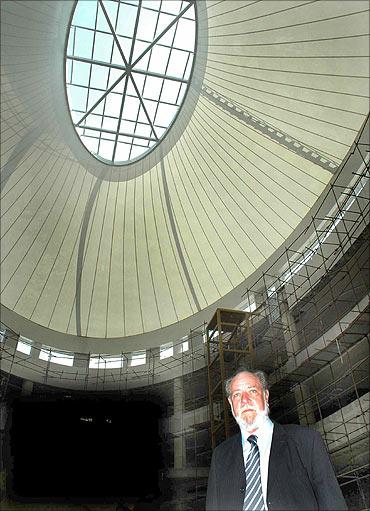
With a 10-acre built-in area, Express Avenue is going to be the largest mall in South India when it opens in April 2010. It will also be the first mall in Chennai that will house a shopping centre, a business centre, a hotel and a multiplex.
The mall is promoted by Express Infrastructure and is conceptualised by Kavita Singhania, managing director and chief executive officer of Express Infrastructure.
Kim Culley, who has more than 30 years of experiences in shopping centre operations, is the chief operations officer of Express Avenue.
Culley's experience in retail started with his founding his company (Spud U Like) in the United Kingdom in 1974.
It has grown to be a national chain in the UK. He has been involved in developing shopping centres in the UK, West Asia, China and now India.
In an interview with rediff.com, Culley talks about the future of malls and retail sector in India.
Why did you decide Chennai to be the place for building the mall?
The answer is simple: the owner-developer had the land here, and they were trying to make good use of it. That is the main reason. There is also a shortage of quality malls in Chennai.
Therefore, a marriage between the idea and the land just seemed inevitable!
In the last two years, many malls in Gurgaon and other places have downed shutters. Did that worry you when you started this project?
The economic downturn is always a worry but we knew what we wanted to achieve. I think the media hyped the recession a lot in India. It did frighten many.
Before the recession, people were bullish towards rent. People paid whatever they had to pay. Thereafter, the retail community turned introverts. Of late, retailers started fine-tuning their businesses and margins more closely and became tighter on rentals. . . .

How does the retail sector in India look at malls right now?
Now they are a little more sophisticated in their decision-making. Though there was a recession, many in the retail sector had a very good year and their profit margins increased.
It is true that those in the retail sector are a lot more cautious now in acquiring space in malls. The one retail chain that has taken space here (in Chennai) told me that it registered 50 per cent growth last year.
There have been problems but not as much as the media had portrayed. India has been more insulated than other countries and, therefore, it was not much affected by the recession.
Look at China, it registered 10 per cent growth.
How do you compare the retail sector in India with the one in the developed world?
Retail sector is in an embryonic stage in India. That is primarily why I am here! Here, you have very few malls in relation to the size of the country. Therefore, there is a huge development potential for malls here.
Before arriving in India, I was in China. China was anticipating 1,000 new malls in the next five years. Considering that, India has an immense future!
How do you compare the Chinese and Indian retail markets?
Chinese retail market is a little more developed than that of India. They have several more sophisticated malls. The Chinese are great believers in their own talent.
It is the expat community in China which is helping the industry develop, more so than in India.
Also, Chinese infrastructure is better. Therefore, the retailers can get deliveries to the country and ship them across a lot more quickly than their Indian counterparts. That is what is inhibiting international retailers from coming to India. Click NEXT to read futher. . .

Are you eyeing the middle class of India?
We hope to cater to every section of the society. Majority of our retail consumers are from the middle socio-economic groups.
We have Big Bazaars to cater to the bigger mass markets. We hope to keep the luxury items there as well.
Are international retailers still cautious about India? There were talks about many big names in retails like Tesco etc coming to India but nothing happened. . .
All the big retailers regard China and India as their future. At the moment, they are concentrating on China because the retail sector is a little more advanced there than in India, especially as far as infrastructure is concerned.
However, I am sure that India too will catch up soon.
How do you expect the retail sector in India to change?
It will change. And the first step towards that direction will be development of malls. In the last 30 years, malls have mushroomed in the United States, Europe and West Asia.
In some parts of the world, they are very sophisticated. And as the consumers turn sophisticated, those who cater to them also wear a new look.
Malls nowadays do not mean shopping centres alone but they also house entertainment and eating outlets. Therefore, when you go to shop, you get to socialise and also entertain yourselves.
Malls are now shoptainments -- they are a huge industry. The shopping malls in Dubai have skiing facilities and in the US, there are amusement parks. Malls are the landmark buildings almost in every country. . . .

In the developed countries, are they located in the centre of the city like the one you are building in Chennai, and or on the outskirts?
It changes as the industry develops. In the West, malls used to be at the city centres but congestion forced them to the suburbs. Americans call it a doughnut effect. Therefore, now in the West, the largest malls are in the suburbs.
In the UK, in Kent, a mall attracts people 400 miles away from France, Belgium, etc. Twenty years ago, you could not even imagine such a thing. Such is the power of modern well-planned shopping centres.
In the next few years, shopping malls will be at the centres of the cities in India. As malls evolve and develop, as space becomes expensive in city centres, malls are forced to move to the suburbs. But then one needs to have the infrastructure, road network to access those suburban places easily.
How do you compare the consumer behaviour of the West, China and India?
Actually it is the same all over the world.
People look for the same essential elements in malls and good shopping centres must essentially have good restaurants for socialising. A multiplex is also a 'must-have' in today's malls. These are the universal features.
China has more disposable income than India and so one comes across higher-end luxury brands in malls there. When the industry grows, it is sure to happen in India too.
As consumers mature, they expect to get the same things that are available in the malls of the developed world.
How much do you expect the retail sector in India to grow in the next 5-10 years?
It will be astronomical. I am aware of the fact that many international retailers, who are not present India, have earmarked this country as a potential market.